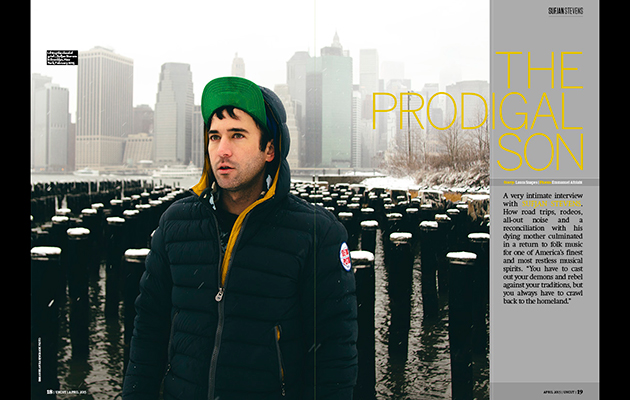
Even if he’d rather not discuss specifics, Stevens is glad that he’s releasing Carrie & Lowell: hopeful about its universality and the path it might offer fans out of their own grief. The experience has also taught him a lot about living more healthily, a process that has included “eradicating resentment, and refusing to feel entitled or take anything for granted,” he says.
Where Adz is manic and frazzled, Carrie & Lowell is utterly lucid. “When you’re met with a very tragic event, you have to take stock of what’s real internally and emotionally and allow yourself to express those feelings,” he says. “Up until the death of my mother, I’d evaded that deepness of feeling in general. But grief is an extremely refining process. I felt I needed to be honest with my feelings for the first time.”
To stay on course, he must remain nearsighted: “I have a problem when I start thinking cosmically because I lose sight of the exact nature of joy in my life, and I obscure it with grand, universal anxiety,” he says. But the album doesn’t indicate any kind of permanent musical volte-face: Lowell Brams mentions an “electronic noise album” that the pair are finishing. Before that, though, Stevens will make his first UK festival appearance headlining End Of The Road in September. It’s an appearance 10 years in the making, but perhaps strange timing given the quietness of the record. “It’s gonna be a challenge,” says Stevens. “I think it would be disingenuous to engage with the full-throttle back catalogue. So don’t come expecting a party.”
When Stevens returns to this office after the Carrie & Lowell tour is over, there will be no cute props awaiting transfer to his prosaic personal archive. Instead, his survival and recovery is its legacy.
“Love is incomprehensible,” he says. “It’s a very simple and stupid statement, but it feels extremely profound and necessary and helpful for me right now to wave that banner. There is no justice in love or in death, but I think that we as living survivors of this world and this life have a duty to give testament to a deeper joy that we’ve been given. I’m not exploiting my misery – I don’t want to do that. If that’s how the record comes across then I’ve failed as an artist.”



